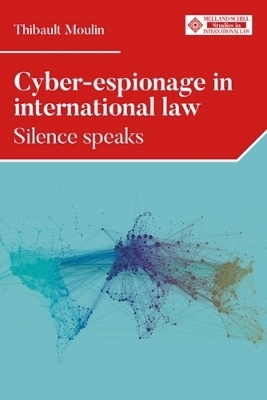
Cyber-Espionage in International Law
Manchester University Press (Verlag)
978-1-5261-6803-0 (ISBN)
While espionage between states is a practice dating back centuries, the emergence of the internet revolutionised the types and scale of intelligence activities, creating drastic new challenges for the traditional legal frameworks governing them.
This book argues that cyber-espionage has come to have an uneasy status in law: it is not prohibited, because spying does not result in an internationally wrongful act, but neither is it authorised or permitted, because states are free to resist foreign cyber-espionage activities. Rather than seeking further regulation, however, governments have remained purposefully silent, leaving them free to pursue cyber-espionage themselves at the same time as they adopt measures to prevent falling victim to it.
Drawing on detailed analysis of state practice and examples from sovereignty, diplomacy, human rights and economic law, this book offers a comprehensive overview of the current legal status of cyber-espionage, as well as future directions for research and policy. It is an essential resource for scholars and practitioners in international law, as well as anyone interested in the future of cyber-security. -- .
Thibault Moulin is an Associate Professor at the Catholic University of Lyon and a Research Associate at the Federmann Cyber Security Center of the Hebrew University of Jerusalem. He also serves as a Captain in the Reserve (RC) of the French Air and Space Force. -- .
Part I: Introduction
Introduction to Part I
1 Main notions
1.1 The concept of ‘cyber-espionage’
1.2 The concept of ‘cyber-space’
2 Methodological and conceptual frameworks
2.1 The determination of law
2.1.1 The approach to treaty interpretation
2.1.2 The approach to sources
2.2 The concept of normative avoidance
2.2.1 Definition
2.2.2 Novelty
Part II: The rules connected to territorial integrity
Introduction to Part II
3 Territorial sovereignty
3.1 The dissimilarities between physical trespass and digital intrusion
3.1.1 Espionage per se is not an international wrongful act
3.1.2 The lack of an analogy between digital and physical intrusions
3.2 The ‘do-not-harm’ challenge and the minimal effects of cyber-espionage
4 Collective security law
4.1 A traditional interpretation of the UN Charter does not result in a regulation of cyber-espionage
4.2 Alternative interpretations of cyber-espionage do not result in the regulation of cyber-espionage
4.2.1 Interpretation based on meta-rules
4.2.2 Teleological interpretation
5 The law applicable between belligerent States
5.1 The territorial rationale of the regulation of espionage between belligerents
5.1.1 The categories of spies defined by the law of armed conflict
5.1.2 The challenging application of rules about espionage in a digital space
5.2 A lack of State support in favour of the application of espionage-related rules in cyber-space
6 The law applicable between belligerent and non-belligerent States
6.1 The absence of a regulation by rules on material operations
6.1.1 The obligations between belligerents
6.1.2 The obligations on neutral States
6.2 A limited restriction of cyber-espionage by rules on the use of telecommunications
6.2.1 The obligations between belligerents
6.2.2 The obligations on neutral States
Conclusion to Part II
Part III: The rules disconnected from territorial integrity
Introduction to Part III
7 The law of diplomatic relations
7.1 Indirect regulation of espionage by embassies
7.1.1 The accreditation of the mission
7.1.2 The performing of the mission
7.2 Indirect regulation of espionage on embassies
7.2.1 The lack of regulation by the inviolability of diplomatic premises
7.2.2 The incompatibility of cyber-espionage with the rules protecting the inviolability of archives and documents
8 International economic law
8.1 The absence of a prohibition of economic cyber-espionage
8.1.1 The absence of a prohibition by national treatment
8.1.2 The absence of a prohibition by the obligation to protect undisclosed information
8.2 The tolerance of cyber-espionage required for the preservation of essential security interests
8.2.1 Cyber-espionage activities in peacetime
8.2.2 Cyber-espionage in a time of war or other emergency in international relations
9 International human rights law
9.1 The absence of extraterritorial jurisdiction in the event of remote cyber-espionage activities
9.2 The measured regulation of surveillance activities by the right to privacy
9.2.1 Interference and legality
9.2.2 Legitimacy and proportionality
10 State practice
10.1 The unanimous prohibition of espionage by domestic criminal laws
10.1.1 The traditional prohibition of espionage
10.1.2 The progressive prohibition of digital intrusions and interceptions
10.2 The predominant authorisation of one’s own intelligence activities against other States
10.2.1 Provisions authorising intelligence gathering
10.2.2 Grounds allowing intelligence collection
11 Opinio juris
11.1 The absence of a right to spy
11.2 The absence of a prohibition on espionage
Conclusion to Part III
Conclusion
Index -- .
| Erscheinungsdatum | 04.04.2023 |
|---|---|
| Reihe/Serie | Melland Schill Studies in International Law |
| Verlagsort | Manchester |
| Sprache | englisch |
| Maße | 156 x 234 mm |
| Gewicht | 617 g |
| Themenwelt | Recht / Steuern ► EU / Internationales Recht |
| Sozialwissenschaften ► Politik / Verwaltung ► Staat / Verwaltung | |
| ISBN-10 | 1-5261-6803-0 / 1526168030 |
| ISBN-13 | 978-1-5261-6803-0 / 9781526168030 |
| Zustand | Neuware |
| Haben Sie eine Frage zum Produkt? |
aus dem Bereich


